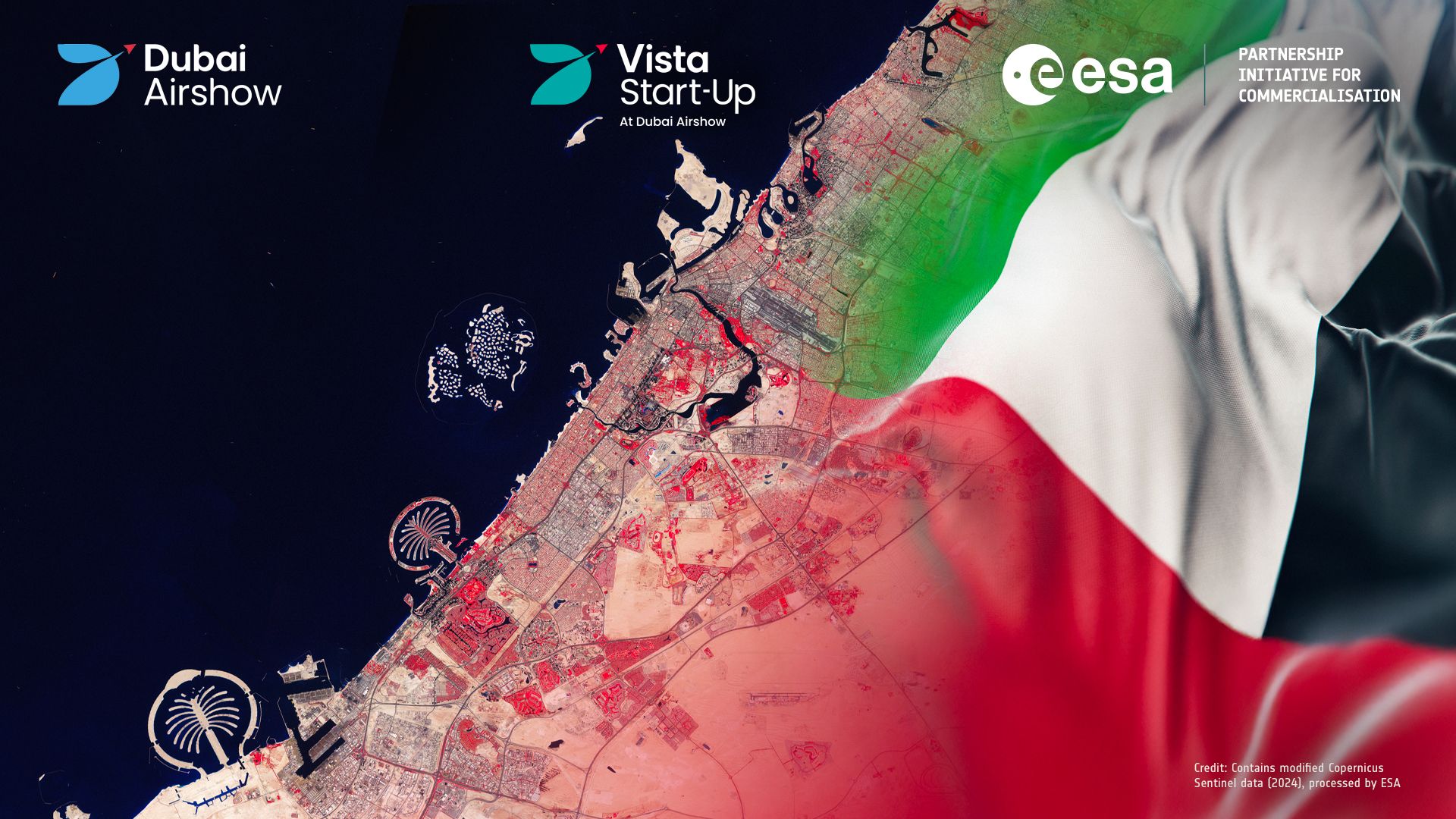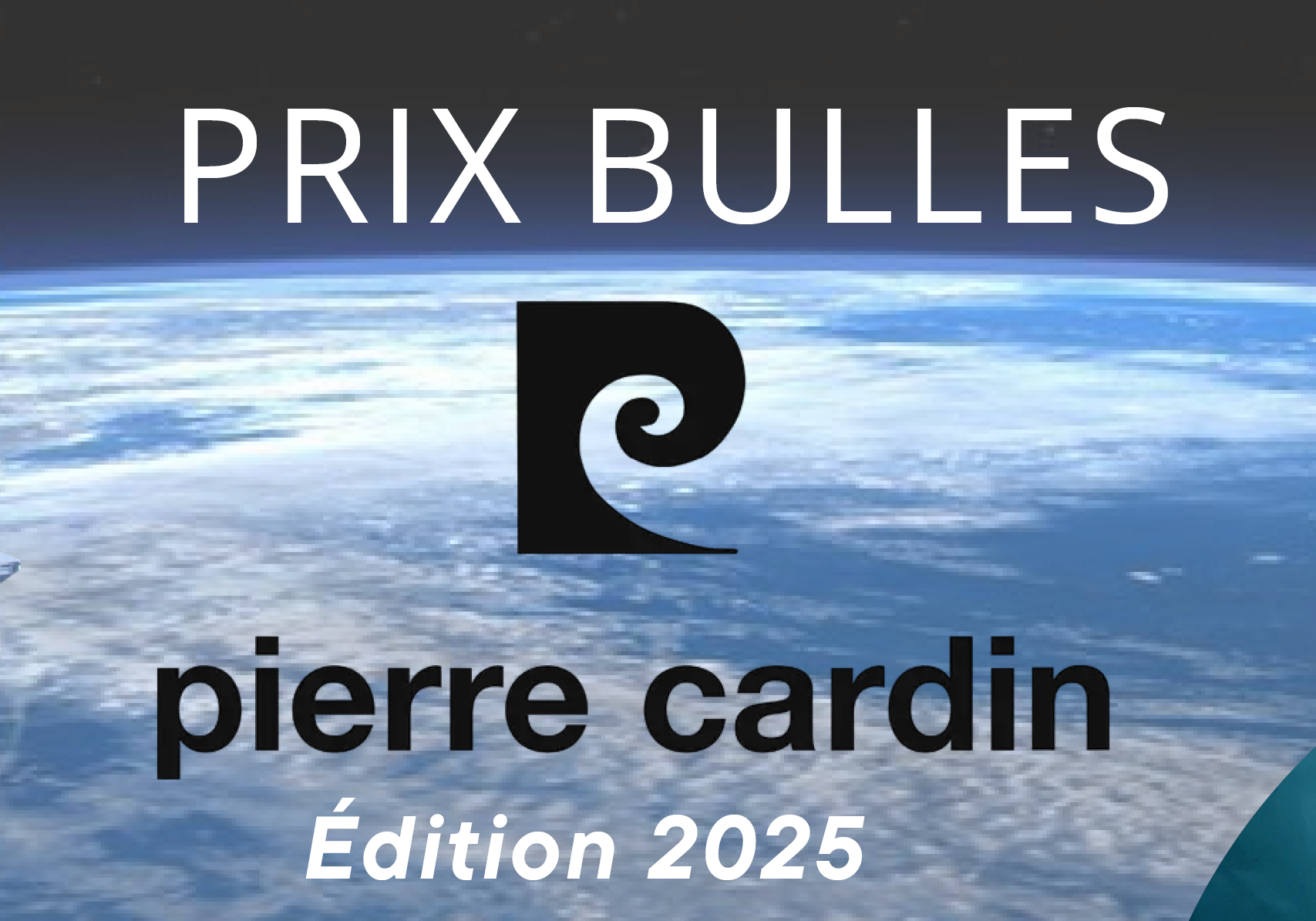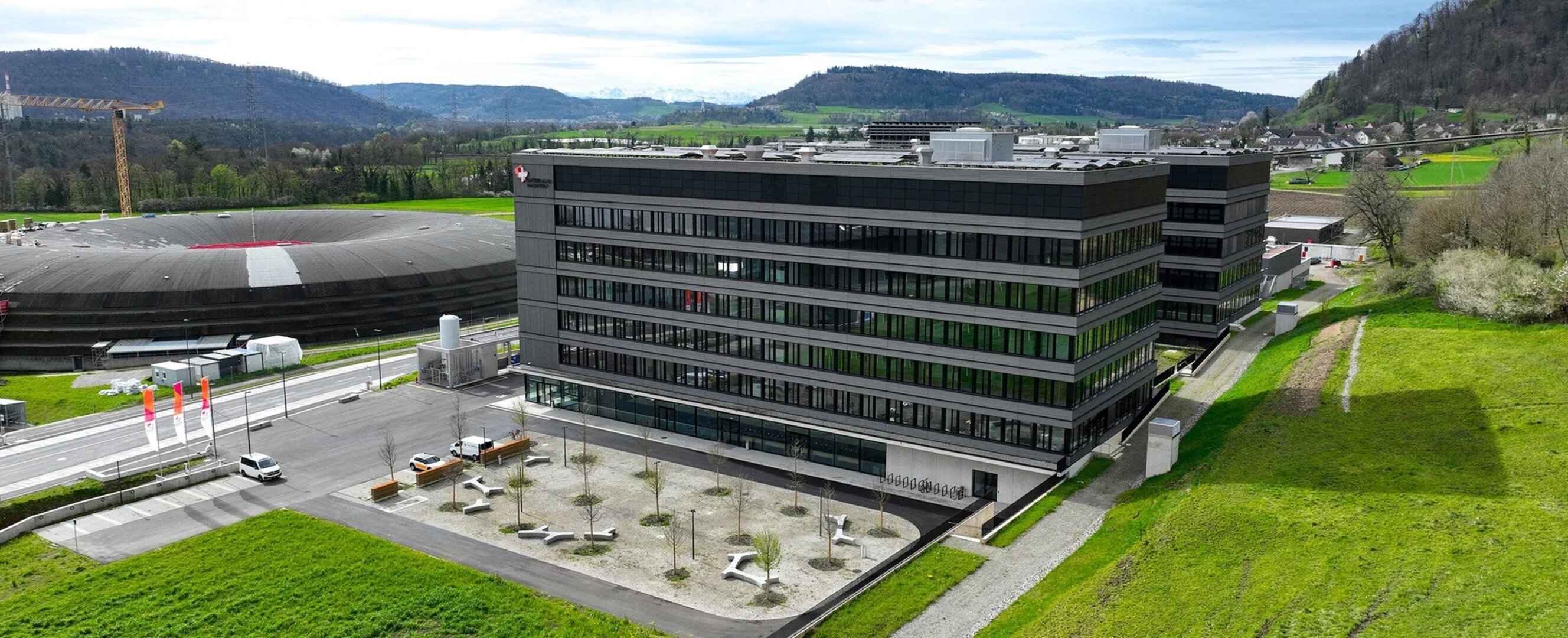On 9-10 December, the ESA Investor Forum, held in Frankfurt, Germany, brought together key players in the space industry to discuss the main commercial space dynamics and programmes currently underway in Europe. The forum aimed to foster dialogue among government officials, public institution representatives, financing experts, and pioneering space companies.
Unlocking Space Potential: Key Insights from the Event Openings
The forum started with welcoming remarks from Rolf Densing, Director of Operations and Head of ESOC at ESA, Dr. René Kleeßen, Director of Organisations and Infrastructures from the German Space Agency at DLR, and Luca Del Monte, Head of Commercialisation Department at ESA. With a central focus on space commercialisation, the event emphasised the importance of collaboration and innovation in the space sector. ESA’s pivotal role was highlighted, showcasing the agency’s support for over 120 unique missions and preparations for more than 40 future missions.
ESA’s Mission Portfolio and Cybersecurity
The first day of the forum set the stage with an introduction to ESA’s extensive mission portfolio and the critical role of ESOC in mission operations and space safety, showcasing the European Space Operations Centre (ESOC) in Germany as the hub for mission operations, space safety, and ground segment engineering. Rolf Densing emphasised the importance of cybersecurity in protecting ESA’s missions and the need for robust ground segment infrastructure.
Technological Benefits and Germany’s Role
To follow, René Kleeßen highlighted the benefits of space technologies in everyday life, such as Global Navigation Satellite Systems (GNSS) for navigation and mobility, satellite communication for disaster recovery, and Earth observation for climate change monitoring. The session also underscored Germany’s role in the ESA Business Incubation Centres (ESA BICs) network, supporting over 500 start-ups and creating more than 5,600 high-tech jobs.
ESA’s Commercialisation Framework
Luca Del Monte presented an overview of ESA’s commercialisation framework, which covers product and market readiness and access to market through initiatives like Phi-Labs, ESA BICs and Accelerators, the ESA Marketplace, feasibility studies, demo and growth projects, and the ESA Investor Network. The agency’s commercial framework aims to support the development of missions, technologies, applications, products, and services targeted for commercial markets, and to foster the growth of new innovative companies in close cooperation with Member States.
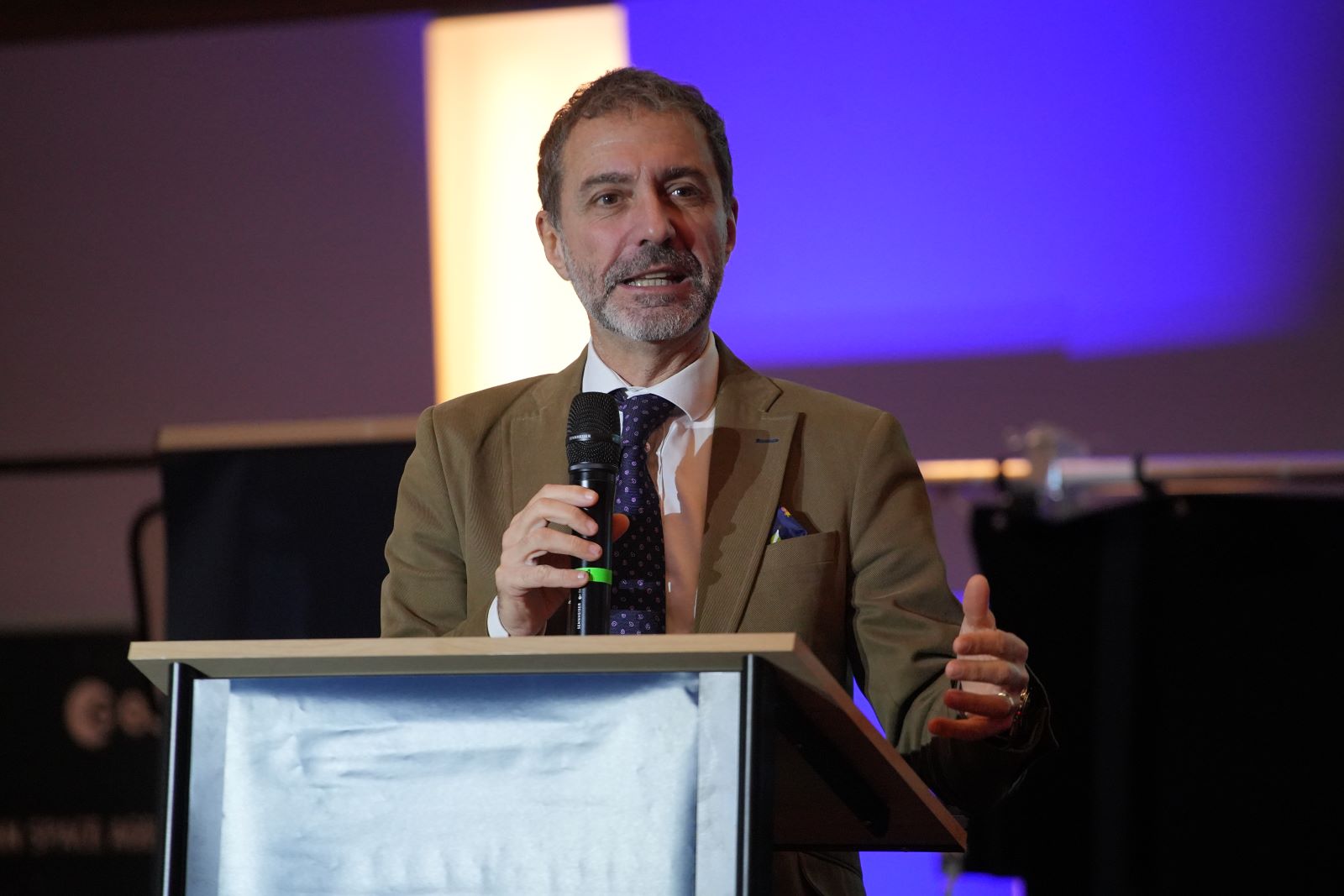
Luca Del Monte, Head of Commercialisation Department at ESA
Investment Opportunities and Technological Advancements
On 10 December, the event continued to build on the momentum from the first day, focusing on the commercial opportunities and technological advancements in the space sector. Dr. Peter Gräf, Director for Applications and Science from the German Space Agency at DLR, marked the beginning of day two, presenting the vast investment opportunities in the space economy. He highlighted the significant economic benefits generated by the GNSS and the paradigm shift initiated by NASA that opened space as an investment category. Dr. Gräf also discussed the progress in fostering commercial launch services in Europe, noting the success of the Micro-Launcher Competition and the European Launcher Challenge.
Panels and Keynote speeches
The event featured five panel discussions, each focusing on a critical aspect of the space industry, along with insightful keynote speeches and start-ups pitches.
Space Safety: a European Market Perspective
Holger Krag, Head of Space Safety at ESA, opened the session by highlighting the importance of sustainable practices and strong partnerships to ensure long-term safety in space operations.
The Space Safety panel discussed becoming advocates for the sustainable use of space. Panelists underscored the importance of launching satellites to observe space traffic in-situ, building strong partnerships with suppliers, customers, and investors, and the role of private actors in complementing public space weather services. The focus on providing reliable and timely information about dangerous space objects and the need for better space traffic management and debris mitigation strategies were also highlighted.
In-space Transportation to Unleash the Orbital Economy
Jerome Breteau, ESA Head of Future Space Transportation Systems, highlighted the potential of in-space transportation to drive economic growth in orbit, remarking the importance of reusable spacecraft and in-space manufacturing. He also discussed ESA’s space transportation commercial programmes, such as the Future Launchers Preparatory Programme (FLPP), which aims to develop next-generation launch systems and technologies to enhance Europe’s competitiveness in the global space market.
Following the keynote speech, the panel discussion, moderated by Philip Thomas, Head of ScaleUp Programme at ESA, focused on the future of the space transportation economy, the role of private and public sectors, and the technical and commercial challenges in enabling a sustainable in-space transportation ecosystem.
Commercial Space Stations and Commercial Space Flight
Thomas Reiter, former European Astronaut, discussed the current state and future prospects of commercial space stations and space flight. He explored the commercialisation of Low Earth Orbit (LEO) and the role of commercial space stations in scientific and technological experimentation, on-orbit manufacturing, and astronaut training.
The panel discussion, moderated by Francesco Liucci, Innovation Management Officer at ESA, explored the transition from the ISS to commercial space stations, the development of reusable spacecraft, and the importance of scalability in reducing costs and increasing mission frequency.
Telecommunications
Xavier Lobao Pujolar, ESA Head of Future Projects Division, discussed the integration of satellite telecommunications into the broader ecosystem and the growing demand for satellite broadband and connectivity. He examined the challenges and opportunities in the telecommunications sector, including the rise of new players and the strategic importance of satellite communications. The Telecommunications panel discussion remarked the importance of delivering products with differential value through continuous innovation, enhancing connectivity to adapt to market demands, and exploring new opportunities like space-based data storage.
Space Policy: a European and German Perspective
Anna Christmann, Aerospace Coordinator of German Federal Government and the Commissioner for Start-ups and the Digital Economy at the Federal Ministry of Economic Affairs and Climate Action, opened the session, hosting Celestino Ugo, Policy Officer and DG DEFIS from the European Commission, Christine Klein, Head of the Industrial Policy and Auditing Department at ESA, Tomas Hrozensky, Senior Researcher and Lead on European Engagement from the European Space Policy Institute (ESPI), and Markus Möller, Member of the Management Board at OHB. The panelists discussed the European and German perspectives on space policy, and the need for strategic investments and supportive regulatory environments to foster innovation.
Supporting Innovation and Investment
The forum also included special sessions that provided an overview of the ESA Investor Network, the ESA Marketplace, and the announcement of the ESA Business Accelerator Germany.
Gianluigi Baldesi, Head of Ventures and Financing Office at ESA, presented the ESA Investor Network, which leverages ESA’s technical, market, and industrial expertise to attract capital into the European space ecosystem. Investors from the Network, as Jaroslav Toth from the European Investment Bank, and Maxime Mallet from Jolt Capital, discussed the importance of financial advisory services, investments in innovative start-ups and mid-caps, and the role of venture capital in supporting space-tech companies and the need for strategic partnerships.
The ESA Marketplace, presented by Kais Barmawi, Commercialisation and Programme Management expert at ESA, facilitates business-to-business deals and co-funding opportunities, while Barbara Mehner, Management Partner of the XPRENEURS Incubator, introduced the ESA Business Accelerator Germany, which offers tailored support, access to a leading start-up ecosystem, and engagement with relevant investors.
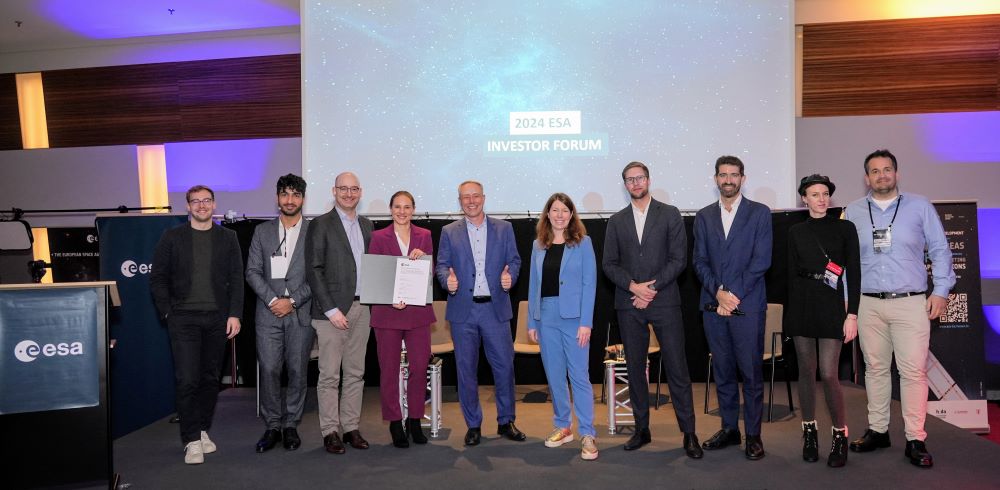
Announcement of the ESA Business Accelerator in Germany
Pitching Start-ups and the Pitch Award Ceremony
A significant highlight of the forum was the pitching sessions, where a total of 25 start-ups presented their innovative ideas. Among these, 15 start-ups were participants in the ESA Business Incubation Centres (ESA BICs) programme or were recognised as ESA Rising Stars. These start-ups showcased a wide range of technologies and business models, aiming to attract investment and partnerships to further their development.
Here are the pitching start-ups for each session:
| Session | Start-ups |
| Space Safety – a European Market Perspective | |
| In-space Transportation to Unleash the Orbital Economy | |
| Commercial Space Stations and Commercial Space Flight | |
| Telecommunications |
The pitching sessions culminated in a Pitch Award Ceremony, where three start-ups were mentioned for their outstanding contributions. ATMOS was awarded for the most disruptive commercial technology, Capsule Corporation was recognised as the sustainability pioneer, and Arkadia Space received the award for the best pitch.
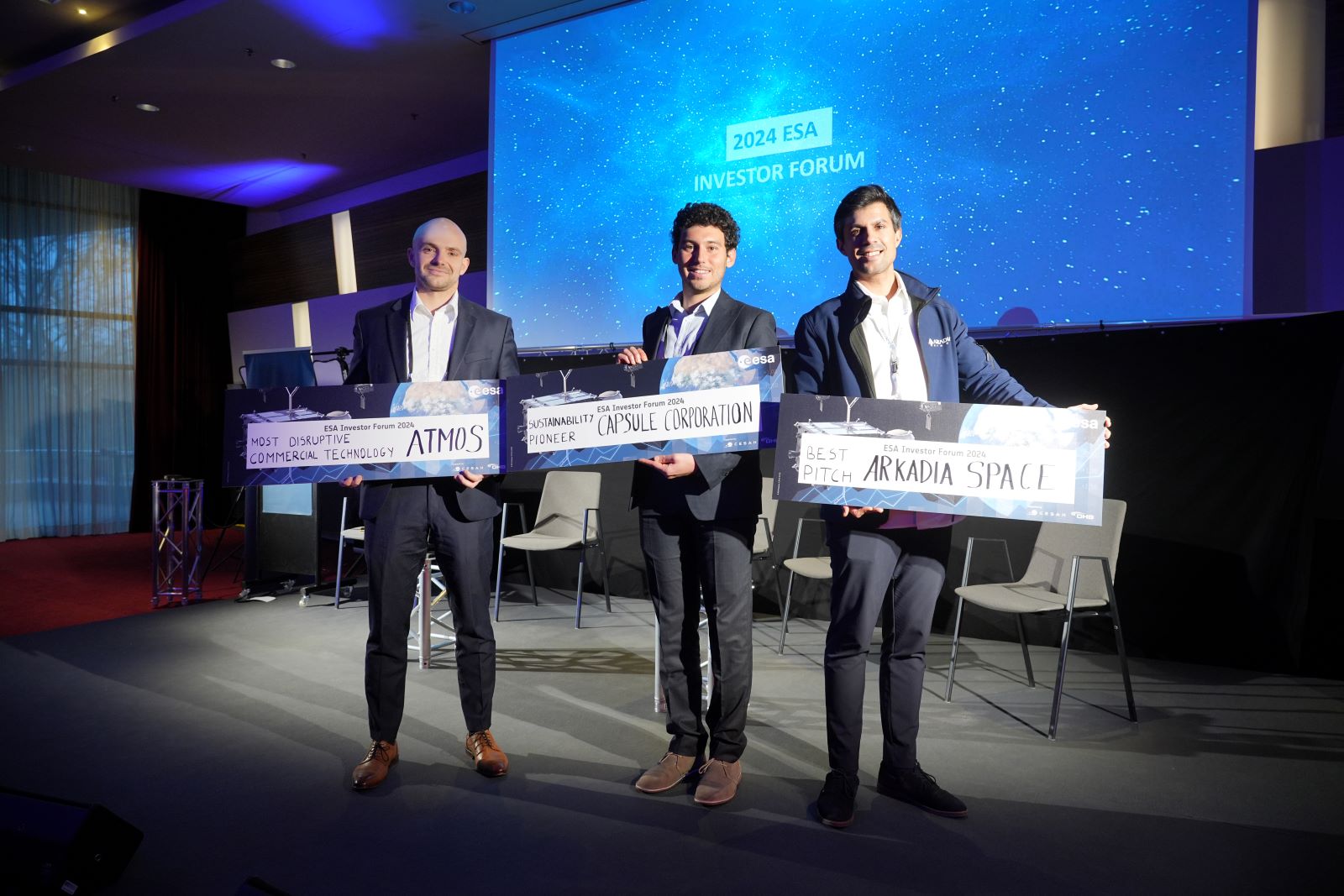
The three awarded start-ups
Public-Private Synergy for the European Space Economy
The ESA Investor Forum successfully brought together key stakeholders in the space industry to discuss and promote the commercialisation of space activities in Europe. The event highlighted the growing opportunities in the space economy and the importance of public-private collaboration in driving innovation and investment in this sector. The insights shared during the forum underscored ESA’s critical role in supporting space technologies, addressing global challenges, and advancing economic growth.
